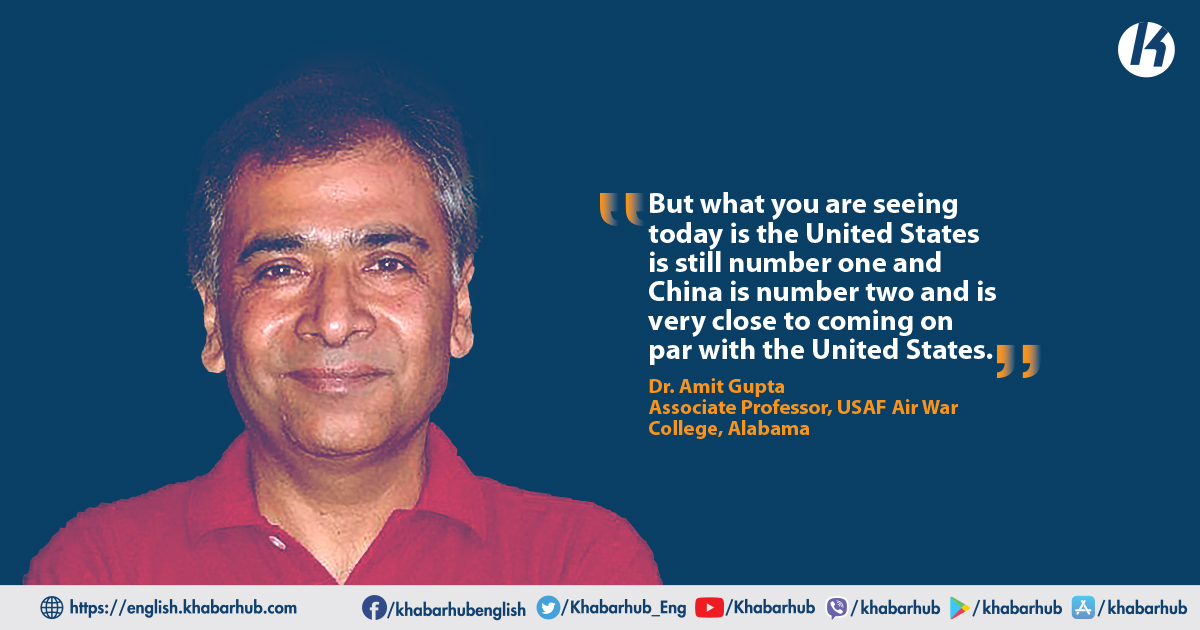Dr. Amit Gupta is an Associate Professor at the USAF Air War College, Alabama. His writings have focused on arms production and weapons proliferation, South Asian and Australian security policies, Diaspora politics, popular culture and politics, and, more recently, on the US-China rivalry and the impact of demography on US foreign policy.
His articles have appeared in Orbis, Asian Survey, Security Dialogue, The Round Table, and Mediterranean Quarterly.
He is also the author or editor of seven books the most recent of which are: Air Power: The Next Generation, Amit Gupta Ed., Howgate Publishing, 2019 and Maritime Heritage and Challenges in the Indian Ocean and the Western Pacific, Howard M. Hensel and Amit Gupta (Eds.) Routledge, 2018.
Dr. Pramod Jaiswal, Strategic Affairs Editor at Khabarhub, spoke to Dr. Amit Gupta on Biden’s China Policy.
How far has the Biden administration continued Trump Policy in dealing with China? Is the Biden administration still uncertain about China’s policy? What does the future hold for US and China relations? Is the US-China conflict inevitable? What will follow the “US’s War on Terrorism”, is it the ‘War on China’?
From the times of President George Bush Junior, the US has tried to shift towards having China as a strategic competitor; along comes 9/11 and for the next 18 years, Bush and Obama could not shift out of the Middle East.
In the 18th year, the second year of the Trump presidency, Trump starts to make the push towards China by lessening the Middle East.
He manages to do that by two things; one he says, I’m not going to continue wars, two, I’m not going to get involved in new wars and three, I’m going to get as many countries as possible to recognize Israel and if you think about it, more countries recognize Israel during the Trump administration than every administration from Carter to Obama put together.
So, that is the context in which this happens and what Trump says is China is our long-term strategic rival, we must now gear domestic policy, economic policy and military security policy towards countering the Chinese challenge.
This is what Biden inherits and Trump starts the trade wars against China by raising tariffs; Biden inherits this and the Biden administration is actually quite grateful because Trump has done all the hard work.
So, what you’re seeing now in the Biden administration is a continuation of some aspects of Trump’s policy along with things that the Biden administration considers important.
Now what is in continuation is that the United States is going to challenge China, compete with China and cooperate with China under Biden.
The challenges are going to be the same ones that the Trump administration had in mind, one being- do not allow the Chinese to exercise sovereignty over the East and South China sea.
This has become a core issue and especially since you’ve got these new maritime rules coming out of China, which seem to become more and more geared to making the South China Sea and the East China Sea as Chinese preserves rather than international waterways.
So that is going to be the first part of the challenge. The Biden administration is quite serious about human rights in China and we’ve seen this with Xinjiang and the Uighurs.
So, that is the second aspect of it which is important. Where they’re different from Trump is that there is an understanding that you have to compete technologically with the Chinese and the Trump administration started this when it started to get tough with Huawei and other Chinese companies in America like Tik Tok.
Where Biden is headed is to try and bring back the kind of technological superiority that America had because if you look at the United States, the United States does not make the best cars in the world or the best refrigerators or the best televisions but what it does is it comes up with the newest technology.
So, in 2007 and it’s hard to believe it’s only been fourteen years, the United States came up with the iPhone and if you look at it, this has transformed the way we look at the world because we really don’t have a phone, we have a computer, a hand-held computer.
Today the Chinese are making phones such as the OnePlus and Huawei which are of course very good and they are all half the price of apple.
But the fact is the Biden administration understands that you have to compete and the areas of competition are number one- 5G, because whoever controls 5G, and this was said by Vladimir Putin, that whoever controls 5G will dominate the international system of the future.
So, both the US and the Chinese are trying to establish as much of their global communications network as possible.
But the third thing is you have to cooperate and you have to cooperate for a simple reason- the global economy is not what it used to be during the cold war, there is a very high level of integration.
I have said this before while talking to the Nepal Institute of International Cooperation and Institute that today in 2020, China’s largest trading partner became ASEAN at about $720 billion; the second largest was the European Union at about $630-40 billion; third was the United States at $560 billion.
So what the Chinese have done is set up a huge global trading network which you can’t really ignore and you have to respect that the network will drive the way people think; so if you are Singapore or Thailand and you have $720 billion trade with the Chinese, you can’t sit there and say we are pro Americans and we completely and whole-heartedly support American policy; there is going to be a balance.
Now, what the Biden administration understands is that cooperation will have to come because of trade, and global supply chains and also because you can’t do climate change reversal without the Chinese; you can’t really develop large parts of the world which are ungoverned spaces or less developed without the Chinese.
The Chinese are laying down the fiber optics, the 5G in Africa but the Americans can go in with the software and the programming to make all that 5G extremely profitable for these countries.
So, you have to think in terms of global development and one of the things which come out of the whole Afghanistan thing is if you are the United States and you want to make sure that parts of the world don’t remain violent ungoverned spaces, then you need somebody to go in there and create a future for those people and that future may only be given by the Chinese.
There is nobody else willing to invest, or the ‘war on terror’ becomes the ‘war on China’. I wouldn’t call it a war, but competition and the reason for that is war would be horribly expensive for both countries; the global economy would collapse and enough smart people in Washington and Beijing know this.
But what you are seeing today is the United States is still number one and China is number two and is very close to coming on par with the United States.
Obviously, if you are number one, you don’t want to become equal or don’t want to be number two. So, the competition will continue. And I’ll say the third part of this competition because this is going to be determined by countries such as Nepal, Singapore, Bangladesh, Myanmar, so on; we keep talking about a western, or rather a liberal international order- the problem is, that is not an order that came out of Asia or Africa, then the countries of Asia and Africa look at that and say is this necessary in our interest.
It’s all very easy to talk about the western international order if you are Belgium or Sweden, how is that western international order relevant to Myanmar or Brunei.
And in that sense, what the Chinese are talking about, when they talk about alternative models of order, is very important to the rest of the world.

How has the US perceived China’s new maritime rules designed to control the entry of foreign vessels in what Beijing calls “Chinese territorial waters” in the disputed seas of South China? Is it likely to cause more rift or spike tension in the South China Sea?
I think it will cause more rifts. I also think the Chinese are taking a position that needs to be tempered because under the law of the sea every country has the right of innocent passage through territorial waters of your country and what most countries will say is, please inform us if you are sending a warship through, nobody says we have to give you permission.
The Chinese tend to take a more proactive role, perhaps a bit of an aggressive role in this. And the US will push back, the problem for the US is that it is not a member of the Law of the seas, so you can’t tell the rule of the sea if you are not part of it and in part that’s the problem there.
I think what will happen is the Chinese will eventually come to the bargaining table only for one reason- there is no island in the South China sea which is not occupied, somebody or the other has occupied all the islands; now the only way you can change that is through war but with $720 billion of bilateral trade it is not going to happen.
They will sit down and start talking and I think they will start talking because Beijing will realize that it can’t keep doing wolf-warrior diplomacy.
So yes, the US will push, yes it will be a cause for concern, yes it will lead to militarization by both countries but will it lead to war? I would say most likely no.
In recent years, the US and its allies have witnessed the steady revitalization of Quadrilateral Security. How do you gauge its current capabilities? How is it different or similar to any other conventional alliance and what are the perspectives of its development?
I am a Quad-sceptic, I don’t think it’s an effective organization. There are a lot of talks and a lot of wishful thinking about the Quad.
Let me go down what are the problems; militarily, the Australians, the Japanese, and the US have interoperability, you can take an Australian officer and put him on a Japanese ship, a Japanese on an American ship- they will know what to do because their technology and training is the same and they all do exercises together.
India doesn’t fit into that and I have written about this, to get the Indians to a level where the Australians, Japanese and Americans are in terms of technology, intelligence surveillance, reconnaissance, interoperability, etc is going to be about $100 billion.
India doesn’t have that kind of money and nobody is going to give India that kind of money; so how exactly does India fit in?
The second thing is the Japanese will confront the Chinese in the East China sea, I am not sure whether they will go to the South China sea.
Several Australians that I have interviewed on this including one of their deputy chiefs of the air staff who said our borders are the southern border of India and the maritime border of Indonesia, which is where our prime area of interest is.
We may do things like help with tanker missions or supply missions but to get into conflict with the Chinese is a completely different thing.
Also, the Australians are very casualty averse, they would not be able to take 400 to 500 or a thousand casualties. So I think the military aspect of it doesn’t work, the economic aspect of it is the Chinese have BRI, the Asian infrastructure bank, the Regional Comprehensive Economic Partnership (RCEP). The
US has yet to come up with anything to compete and if you want to compete with the Chinese who are spending a trillion dollars, then you need to spend at least half a trillion; and if you look at the Biden administration, it wants to spend close to $ 4.5 trillion rebuilding America, which is the smart thing to do.
But the problem is if you are spending 4.5 trillion dollars in America, where are you going to get the money to spend around the world?
So, I think the Quad is a non-starter on economic and military issues. I think it can do things in several areas, one, it could build a common 5G network, two, it could talk about a better educational network for Asia because Australian universities, American universities and Japanese universities are world-class.
Imagine if you could do remote learning for large parts of Asia which do not have that right now; so that would be there.
I think the Australians and the Japanese should put their money where their mouth is and boost India’s vaccination production programs so more people in Asia can get vaccinated because that would be a more compelling argument than saying “Hey, I put an aircraft carrier off the coast of Vietnam”, nobody cares.
The Quad to me is an idea that comes out of the cold war because it is what you did in the cold war, you built alliances and military capabilities.
We don’t live in that kind of world now and if you are sitting in Kathmandu, I don’t think anybody in Kathmandu is cheering for a Quad.
But if tomorrow the members of the Quad came and said that we will guarantee that by the end of 2022 every Nepalese will be vaccinated, I think you will get a gigantic cheer coming out of Nepal; and in the long run which is more important for the Nepalese people.
So you have to stop thinking in terms that are cold war centric and you have to start thinking in terms of post-cold war through the welfare of greater humanity, and the Quad could do it but right now there is no valuable thinking in that area.
I’ll add one thing on this- no Asian country is going to join the Quad because everybody knows their economic basket and bread is buttered by the Chinese and the Europeans do not have the money to come all the way into the South China Sea and the East China sea.
How can the Indian Navy expand its reach in the Pacific Ocean through the recently signed Basic Exchange and Cooperation Agreement (BECA) between the US and India?
Let me put it to you this way, I had given this talk to the National Maritime Foundation in Delhi on the Indian navy’s plan, 50 percent of whom agreed with me, 50 percent of who disagreed and those who disagreed didn’t listen to what I had said, they listened to one sentence and made that into my thesis, which is not the way things are done.
That one sentence was: aircraft carriers would be highly vulnerable in the South and East China sea, there would be better use in the western Indian ocean.
That was made into- India doesn’t need aircraft carriers, which is not what I said. The problem for India is quite simply this- the Indians can make China’s life miserable if they had a large submarine force with cruise missiles because it’s not easy to find submarines, submarines can inflict a lot of damage and you can hurt a lot of Chinese maritime shipping and naval shipping that way.
So, I would say, you can have talks about going into the South China sea. However, going into the South China sea is not that easy because the Chinese have a very high defensive capability.
Second thing is, you have to have the logistics, which are very expensive to support a naval force in the South China sea and I just don’t see that happening.
Where I see the Indian navy playing a role is in the Indian ocean, where it should be talking about a maritime order but instead of talking about China, it should be talking about how it can help the countries of West Asia and Africa.
And I will give you one example- in 2004 the African Union had its annual meeting in Mozambique, and the government of Mozambique went to the Indian government and said, can you give us naval security?
So, the Indians sent down some Indian vessels a few days before the meeting and when the meeting was over, they left immediately.
The Mozambicans were very happy. This is the kind of thing, I think, the Indian navy does well and I think the Indian navy should do. Going into the South China sea would be a death trap.
There is a lot of talk for example that the British would go there, the problem for most analysts in the world is they don’t read Chinese.
Read what the Chinese think are the prospects for a naval battle with large vessels like aircraft carriers in the South China sea, it’s not what it is suggested to be in capitals like New Delhi, London, or Washington.
So, my own belief is, it is a nonstarter. It’s like everything else. In South Asia, people love to sit and chat and come up with agreements.
I mean, you know this, you have worked in India. India has a strategic partnership with dozens of nations, and as I always say, you feel sorry for the countries that India doesn’t have a strategic partnership with.
But if you are the strategic partner of everybody, it means that you are the strategic partner of nobody. Because if you look at the United States, the US has 2 key strategic partners, Britain and Israel, it has allies but they come at a lower level, so Belgium is an ally, Brazil is an ally, but in real terms, the two countries which it sees is being very closely tied to strategic interest are Britain and Israel.
And the Indian’s problem is this, you can talk about naval cooperation and everything else but is India on par with Britain and Israel with the United State in the eyes of the US?
The answer is no. and I have always said this to the Indians, that you need to tell the Americans that this is what we want and if you give it to us, we will be your long-term strategic partners.
The Indians can never get that answer because every time I ask this question, I never get an answer. So, I’m sorry to disappoint your viewers, but I think it’s a non-starter, it’s a good talking point, maybe 20-30 years down the line, it does develop into something valuable.

As Russia, China and the US are pursuing their own versions of hypersonic weapons technology, does this signal a new arms race in the region? And will such developments just be limited to these three countries?
The three you mentioned are the top tier of hypersonic missile development. The Indians and the French are the second-tier and then everybody else comes below that. It is a new arm, there is no doubt about that but I would put it differently in my mind.
We have to remember one thing- you can start a short nasty war with high technology but to win the war, you have to occupy a country and that means sitting in that country for 20-30-50 years.
And as you saw in Afghanistan, 20 years was too much. So, hypersonics could lead to an expensive war where Americans and Chinese shoot down each other’s aircraft, hit each other’s ship, but does that lead to a long-term conclusion of the war?
The answer is no. But is it an arms race? Absolutely. And I will say this, we are now entering a phase, where the Americans and Chinese will pull ahead of everybody else in terms of weapons technology.
The Russians will come somewhere after that along with the Europeans, and the rest of the world will be far below that because nobody can afford all this expensive weapons system. Let me give you an example:
When the US launches a cruise missile, a cruise missile is over a million dollars, and if the US fires 300 cruise missiles in a day, that’s 300 million dollars of cruise missiles. Ask yourself, how many countries in the world can afford that?
And the answer is, maybe three, maybe four. So yes, you have a technological race. No, it’s not going to change significant conflict areas in the world.
After the US withdrawal, there is a power vacuum for the great powers in Afghanistan. Who is going to fill that gap? Do you also see the possibility of a China-Pakistan -Taliban axis?
There is an old expression about the Afghans- ‘You cannot buy the loyalties of the Afghans but you can rent their loyalties’, so the Russians rented their loyalties and so did the Americans and most probably the Chinese will temporarily rent their loyalties.
An axis is too strong a word because the Chinese are not interested in getting bogged down militarily or physically in Afghanistan.
They are willing to give some degree of economic help. What they are really concerned about is that Afghanistan should not be a staging point for launching terror attacks into China. With this in mind, they are going to shape their entire Afghan policy.
I’m going to say ‘wait and see’ because the Russians want to put in some money and the Chinese want to put in some money, who knows what the Iranians want to do.
But if the Iranians were imaginative, they would let the Indians build that road-rail link out of Iran to Afghanistan, change the way Afghanistan’s geopolitics was concentrated or organized.
I think it’s too strong to talk about Afghan-Taliban-China and there is one reason, once you start allowing Afghanistan to become a terror camp to stage attacks on countries in the region, especially Iran and India. The next step is it’ll happen in Xinjiang, there is no doubt about this.
The reason being, everybody thinks they can control terrorist groups but we simply can’t, it has never worked well.
Anybody who has tried to control terror groups have known they tend to be independent thinkers and you can recall the LTTE and Sri Lanka, how well did that go for India’s Research Analysis Wing and the answer is not well at all! I will leave this on that skeptical note.
In the pursuit of India’s Act East policy, Indian Navy ships have proceeded on an overseas deployment to South East Asia, the South China Sea and Western Pacific. What does this recent deployment seek to underscore especially in regard to India’s policy in the South China Sea? Does this indicate a shift in India’s policy?
The Indians are doing what from their perspective is the right thing, they are trying to show the Chinese that we are not going to buckle down to you, so they have a greater presence.
The question is- if you are going to be there, who is in that part of the world is going to support you? There is a lot of talk about the Vietnamese being the Quad plus, but if you talk to any Vietnamese, what is the one thing they say?
We don’t want to be part of Quad because Vietnam is one of China’s 10 largest trading partners now. So, while they have differences with China, they don’t want to aggravate China.
You can send ships on a mission, stage exercises, and so on but in real terms are you doing synchronized military planning with anyone? And the answer is no.
So again, 20-30 years down the line we don’t know, but in the short to medium term: which is 5-10 years, I would say the answer is no; it’s symbolic rather than substantive.









Comment